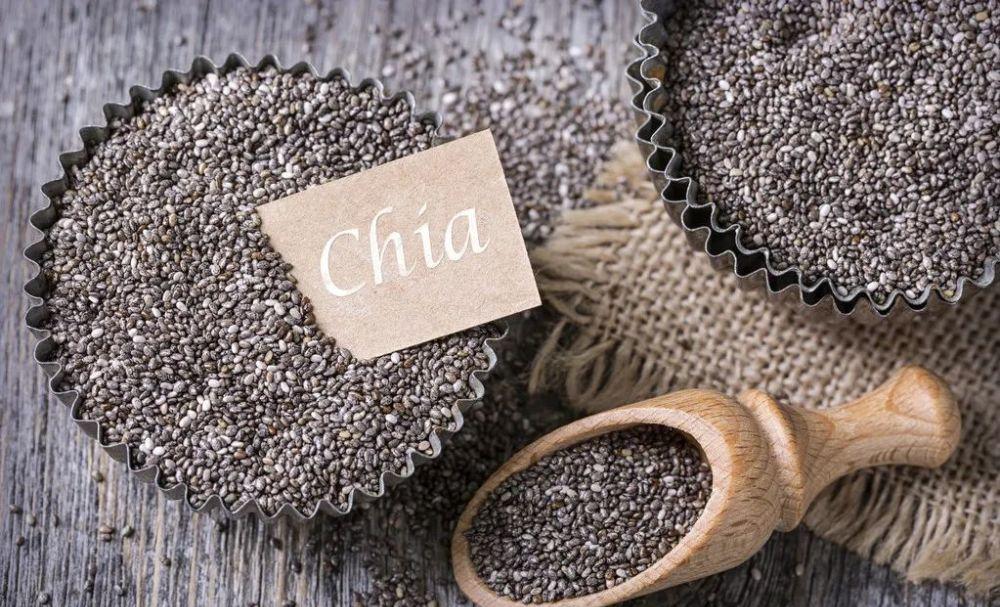The "chia seeds" sought after by dieters are higher in calories than you think
In recent years, "chia seeds" have frequently appeared in the recommended food lists of major dieters, and are also known as "superfoods" because of their nutrient richness.
Eating chia seeds to lose weight, is it really effective?

Experts interviewed
Zuo Xiaoxia, director of the Department of Nutrition of the Eighth Medical Center of the PLA General Hospital
"Weight loss artifact"? The heat is higher than you think
Chia seeds, the seeds of chia chia, have relatively small grains, native to Mexico and Guatemala, a bit like sesame seeds, and range in color from white, brown to black.
On the Internet, chia seeds are sought after by many dieters because of their labels such as "weight loss seeds" and "high dietary fiber", but the scientific community has always been skeptical about the weight loss efficacy of chia seeds.
A paper published in the journal Nutrition Research describes a controlled trial in which 90 obese patients were given chia seeds. Unfortunately, until the end of the experiment, the researchers did not find that chia seeds made any of the experimenters really thinner.
In fact, the oil content in chia seeds can be quite a lot, which can be called a "big oily household". The oil content in chia seeds is 30.0%~35.0%, and the oil content of soybeans is about 20%. The calories of 100g of chia seeds are around 436kcal, which is roughly equivalent to the calories of a fried chicken thigh.
Therefore, chia seeds do not have a weight loss effect, but their rich soluble dietary fiber forms a jelly-like substance after absorbing water and expanding, which is conducive to stimulating intestinal peristalsis and is more likely to produce satiety.
"Superfood"? It is indeed rich in nutrients
In a study published in the journal Impact Factor in the United States in 2018, the Asia-Pacific Center for Theoretical Physics selected the "100 most nutritious foods in the world", and chia seeds ranked fifth because of their rich and comprehensive nutritional content.
Dietary fiber
One of the biggest characteristics of chia seeds is high dietary fiber content (37%~40%), which is much higher than soybeans (15.5%), lentils (10.6%), oats (5.0%), corn (2.3%), etc.
According to the Dietary Guidelines for Chinese Residents 2022, the recommended intake of dietary fiber for generally healthy adults is 25g/day. According to this calculation, eating 100g of chia seeds per day can meet the dietary fiber intake requirements.
Proteins and amino acids
The protein content of chia seeds is about 15%~23.6%, which is higher than that of oats, wheat, corn, rice and other grains. In terms of amino acid composition, chia seeds contain 9 essential amino acids needed by the human body and are rich in glutamic acid, which stimulates the body's nervous system and immune system.
vitamin
Chia seeds are rich in a variety of vitamins, such as vitamin B1, B2, vitamin C, vitamin E, etc., niacin content is high, and rich in phosphorus, magnesium, zinc, iron, calcium, sodium, manganese, cobalt, nickel and other minerals.
fatty acid
The biggest nutritional highlight of chia seeds is that they provide rich α linolenic acid. α linolenic acid is an essential fatty acid that the human body cannot synthesize itself, and polyunsaturated fatty acids can be further synthesized in the body, such as EPA, known as "vascular scavenger", and DHA, which is "brain gold".
Minerals
Chia seeds are rich in a variety of mineral elements, their calcium, phosphorus and potassium content is 6 times, 11 times and 4 times higher than milk, respectively, iron content is 6 times that of spinach, 1.8 times that of lentils and 2.4 times that of animal liver tissue, much higher than wheat, rice, oats, corn and other grains.
Who is suitable for eating chia seeds?
Chia seeds are rich in nutrients, but they are not suitable for everyone. At the same time, daily intake should not be too much, no more than 30g is appropriate.
The "three highs" crowd can eat more
Many studies have shown that chia seeds can effectively regulate blood sugar, blood pressure, and blood lipids, which is very suitable for "three high" people.
A study published in the American journal Nutrition Reviews showed that after consuming more than 7g of chia seeds per day for 2 months, postprandial blood sugar levels were significantly reduced.
People with constipation can try it
Chia seeds themselves have a strong ability to absorb water, help the formation of stool, and relieve constipation.
People with allergies eat with caution
If you are allergic to sesame, peppermint, or mustard seeds, you may also be allergic to chia seeds, so be careful before eating.
People with poor digestion eat less
Chia seeds are high in fiber, and if you eat too much and drink enough water, you may cause constipation, diarrhea, and bloating.
It is best to add chia seeds to some moisture-rich foods before eating, such as smoothies, yogurt, cereals, etc. ▲
Bibliography:
[1] XU Ningning,WU Tian,HUANG Qing. Research progress on active ingredients, physiological effects and development and utilization of chia seeds[J].Science and Technology of Food Industry,2023,44(07):448-454.DOI:10.13386/j.issn1002-0306.2022050225.
[2] Rong Xu, Tao Ningping, Li Yuqi, Gu Saiqi. Analysis and evaluation of nutrient composition of chia seeds[J].China Oils and Fats,2015,40(09):89-93.)
[3] MA Yunfang, XIANG Qisen, SHEN Ruiling, LIN Juan. Nutritional composition, health effects and application of chia seeds in food industry[J].Food Industry,2015,36(05):207-212.)